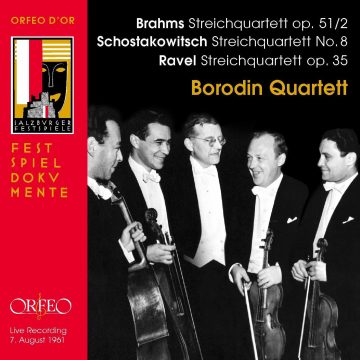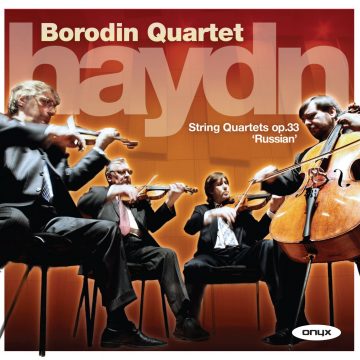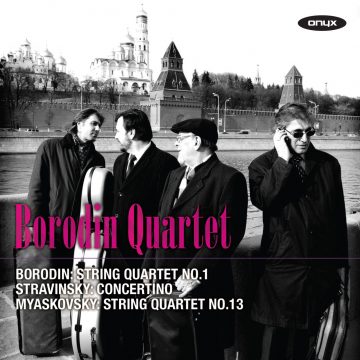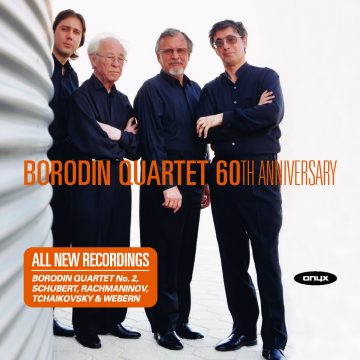For more than seventy years, the Borodin Quartet has been celebrated for its insight and authority in the chamber music repertoire. Revered for its searching performances of Beethoven and Shostakovich, the Quartet is equally at home in music ranging from Mozart to Stravinsky.
Described by the Daily Telegraph Australia as “the Russian grand masters”, the Borodin Quartet’s particular affinity with Russian repertoire is based on constant promotion, performances and recording of the pillars of Russian string quartet music - Borodin, Tchaikovsky, and Shostakovich, as well as Glinka, Stravinsky, Prokofiev and Schnittke.
The Quartet is universally recognised for its genuine interpretation of Russian music, generating critical acclaim all over the world; the Frankfurter Allgemeine Zeitung writes about them “here we have not four individual players, but a single sixteen-stringed instrument of great virtuosity”.
The Quartet's connection with Shostakovich's chamber music is intensely personal, since it was stimulated by a close relationship with the composer, who personally supervised its study of each of his quartets. Widely regarded as definitive interpretations, the Quartet’s cycles of the complete Shostakovich's quartets have been performed all over the world, including Vienna, Zurich, Frankfurt, Madrid, Lisbon, Seville, London, Paris, and New York. The idea of performing a complete cycle of Shostakovich's quartets originated with the Borodin Quartet. In recent seasons, the ensemble has returned to a broader repertoire, including works by Schubert, Prokofiev, Borodin, and Tchaikovsky, while continuing to be welcomed and acclaimed at major venues throughout the world.
The Borodin Quartet was formed in 1945 by four students from the Moscow Conservatory and remains one of the very few existing established chamber ensembles with uninterrupted longevity. The world has changed beyond recognition since 1945; the Borodin Quartet, meanwhile, has retained its commitment to tonal beauty, technical excellence, and penetrating musicianship. The ensemble’s cohesion and vision have survived successive changes in personnel, thanks not least to the common legacy shared by its members from their training at the Moscow Conservatory. The current members of the Quartet are Nicolai Sachenko, Sergei Lomovsky, Igor Naidin and Vladimir Balshin.
In addition to performing quartets, the Borodin Quartet regularly joins forces with other distinguished musicians to further explore the chamber music repertoire. Their partners have included Sviatoslav Richter, Yuri Bashmet, Michael Collins, Alexei Volodin, Barry Douglas, Mario Brunello, Elisabeth Leonskaja, Christoph Eschenbach, Boris Berezovsky, and Nikolai Lugansky.
The Quartet also regularly receives invitations to give masterclasses, and to serve as jury members at major international competitions.
Last season included performances at the BOZAR in Brussels, Berlin Konzerthaus, Liszt Academy in Budapest, Amsterdam Concertgebouw, and Philharmonie de Paris. Over the next seasons the Quartet will embark on a tour of China before returning to performances in Europe at venues including Muziekgebouw Eindhoven, Tivoli Vredenburg Utrecht, Teatro Principal Vitoria and will return to Philharmonie de Paris and Amsterdam Concertgebouw. The ensemble will also embark on a major tour of the USA in Autumn 2025.
The Quartet’s first release on the Onyx label, featuring Borodin, Schubert, Webern and Rachmaninov, was nominated for a Grammy in 2005 in the “Best Chamber Performance” category. The Borodin Quartet has produced a rich heritage of recordings over several decades, for labels including EMI, RCA and Teldec, including the Complete Beethoven quartets for CHANDOS. The Quartet’s recording of the complete Shostakovich String Quartet Cycle for Decca was released in September 2018, following the first release in the cycle, a dedicated 70th anniversary CD (of string quartets Nos.1, 8, and 14), released in March 2015.
This biography is for information only and should not be reproduced.
Beethoven and Shostakovich
Berliner Konzerthaus, 27 September 2022
That Sachenko is indeed the man for the job [as leader of the quartet] was forcibly demonstrated by the Borodin’s devastating reading of the Shostakovich, its unbroken 40-minute arch sustained with the utmost intensity. Vibrato – or the absence thereof – was perfectly gauged by the four players in the opening Elegy, while their pianissimo entries in the following Serenade emerged inaudibly from the preceding sforzatos. Sachenko’s cadenza-like runs in the Intermezzo were judged to perfection and punctuated by perfectly calibrated chords from his colleagues. The piece’s desolate Epilogue was followed by a seemingly interminable silence.
Carlos María Solare, The Strad
Shostakovich Box Set: Complete String Quartets, Piano Quintet
Decca Classics, September 2018
These are intensely musical and emotionally involving performances. The artillery assault in the Eighth Quartet won't rattle your windows, but how refreshing to hear the percussive thuds as actual notes. Everyone knows that work, but there's so much more to explore here. Newcomers should start with the Sixth, a near-perfect blend of wit and melancholy, each section closing with the same bittersweet cadence. Or with No. 5, its powerful opening movement the Beethovenian allegro which Shostakovich complained of being unable to write in a symphony. There's little bluster or padding in these quartets, and anyone who's ever doubted this composer's technical abilities should listen and weep. At the peerless mash-up of mournful passacaglia and folk dance in No. 10, or at what Shostakovich does with a sinuous 12-note theme in the extraordinary 12th Quartet, its exultant final minutes totally devoid of irony.
No. 14’s tender coda glows in the Borodins’ hands, making the bleakness of the nihilistic 15th all the more gruelling. The bonuses are essential listening: we get the two early transcriptions plus the surviving opening movement of an aborted quartet in E flat. New to me were extracts from Shostakovich's score to the 1936 film Girlfriends, the players joined by Alexei Lubimov and trumpeter Sergei Nakariakov. They're fragments, but brilliant. And pianist Alexei Volodin is outstanding in the Piano Quintet: witness how well he matches the strings’ delicacy in the lovely “Intermezzo”. An exceptional release.
Graham Rickson, The Arts Desk
This cycle has all the authority that the group’s musical genealogy would suggest, since we have four musicians who were recruited into the quartet most associated with this music. And what musicians they are. These pieces offer plenty of solo opportunities for each member, not just the leader, and in each case you can hear what fine individual string players these are. More important still, they blend superbly, sounding always as if they are listening to each other. Thus in the angry fugal development of the finale of the briefest quartet, No.7, they produce fast, brilliant and precise playing.
Roy Westbrook, Music Web International
US Tour
March 2019
The quartet’s polished unity of ensemble still allows for individual members to take the spotlight. Violist Igor Naidin’s tonal warmth and projection and the soaring violin of Ruben Aharonian were memorable in solo moments…While the Borodin is best known for performances of Russian music, particularly the quartets of Dmitri Shostakovich, it is a versatile group and a stylish, technically impeccable reading of Haydn’s Quartet No. 6 in D Major displayed its classical bona fides. This was sunny Haydn, played with spirited incisiveness. Aharonian’s violin phrased the singing line of the Andante with grace. The bows seemed to bounce off the strings in a robust Allegretto and the players captured the offhand quirky twists in the stately final movement. In a repeated minor-key episode, Balshin’s swaying cello figure masterfully blended with his colleagues’ more restrained blend.
Lawrence Budmen, South Florida Classical Review
Martinů and Schulhoff Concertos, Vladimir Jurowski and the London Philharmonic Orchestra
November 2018
Martinů’s concerto was written in Paris, though, and seems a much more relaxed, loosely lyrical affair. The solo quartet certainly has much more expressive freedom than it’s ever allowed in Schulhoff’s motoric textures, and since the Borodin Quartet were the soloists with Jurowski and the LPO that was probably a good thing – they found real profundity in the way in which the central slow movement builds to a huge climax, a sudden definitive change of mood in a work that otherwise is often hard to pin down.
Andrew Clements, The Guardian
the Largo at the centre of the three-movement work, with its keening chromaticism, had an intense, slow tread that allowed the Borodin’s famed richness of sound to shine, and the often jazzy finale was played with dizzying panache. More Schulhoff in concert programmes, please!... the Borodin’s playing was suave and often full-blooded, and the orchestral playing was vibrant and colourful.
Von Matthew Rye, bachtrack
Victoria Concert Hall with the Singapore Symphony Orchestra
October 2018
A sugar-coated first half would scarcely have prepared one for the bile of Shostakovich's String Quartet No.15, his final embittered work in this medium. The hall was plunged into near darkness, with the players barely visible through dim lights illuminating their scores. This seemed like the only way to experience the work's six continuous slow movements, highlighted by painful pauses, pregnant silences and interjected dissonances. One could hear a pin drop amid this blanket of unnerving stillness and unease, so grippingly negotiated by the quartet.
Chang Tou Liang, The Straits Times
Musica Viva Australia Tour
October 2018
The group's balance sounded impeccable, the texture individual...the night's finest playing came with Beethoven's Op. 130: rational, involving, the players focused on and rapt in their rewarding discourse.
The Sydney Morning Herald
After 73 years, it does Russian melancholy better than anyone - and this latest incarnation of the legendary group continues in the grand tradition, the famously blended instrumental tone as dark as the four men's matching attire, their ensemble playing as solid as Russian oak...for the chamber music devotee, this was the thing itself, the imposing, vaguely terrifying beast that is the Russian heart and soul laid bare.
Martin Buzacott, The Australian
Here we were treated to the classic Borodin tone with its finely calibrated vibrato and timbral intensity, truly taking us to another place... After the interval came Shostakovich's final quartet, his 15th, Op. 144. The Borodin's performance of this work alone is well worth the price of admission.
Tony Way, Limelight Magazine
The six movements all run on without pause, often with one instrument featured solo for long passages, and the dramatic thread was heightened in this performance by the Borodins playing with the lights down, illuminated by lamps on their music stands. The playing and the effect were both spellbinding.
Steve Moffatt, Wentworth Courier
Chamber Music New Zealand Tour
September 2018
the Borodin Quartet reaffirmed both the pleasure and privilege of experiencing the sublime artistry of one of the world's leading chamber music ensembles...the Borodins held nothing back in their highly-charged performance. They effortlessly conveyed a sense of romantic striving, in both the dramatic to-and-fro of musical argument, and moments in which one sensed rich textures were calling out for fuller orchestral shading.
William Dart, The New Zealand Herald
Rarely have I heard, throughout a varied concert, playing of such subtlety and refinement, and rarely have I heard such superb balances between all four players.
The Dominion Post
The Quartet's restraint gave us a flowing account with beautifully judged flexibility, revealing both the music's variety and the blended homogeneity of the ensemble.
Elizabeth Kerr, Radio New Zealand
National Concert Hall, Dublin with Barry Douglas
November 2017
The famed golden sound of the Borodin String Quartet charmed from the opening double-stops of the Tchaikovsky. If I closed my eyes, it was impossible to tell if the sound was coming from one super instrument or four, so unified was their musical voice. The weaving melodies of the first movement were effortlessly passed from instrument to instrument while the uniform tone was rich and dark – romantic but eschewing any excesses.[...]
The climax came in the second half of the recital with Brahms’ great Piano Quintet, a work which went through a complex and lengthy gestation period[...]Striking a good balance between piano and strings, they imbued the opening with great passion. The transition into the major key was meltingly done while the muscular moments were satisfyingly handled. Balshin poured his heart and soul into his cello part, delivering his lines with a searing intensity.
There was warmth to the Andante melody in the second movement while the Scherzo buzzed with energy, its off-beat accents adding to the sense of urgency. Rejoicing in the driving rhythm, one and all ratcheted up the excitement to a frenzied degree. The threads of music hovered mournfully in the air in the opening of the final movement as it built up in intensity in a succession of different keys.
Por Andrew Larkin, Bachtrack
Friends of Chamber Music Vancouver, Vancouver Playhouse
October 2017
It would be difficult to find a more beautiful sound to listen to: impeccable in intonation, rich and fully integrated, with wonderfully refined shape to the lines and a special communication in the voicings[...]the feeling that emerged from these performances is that Shostakovich’s music is less about sharply dramatic emotional responses and more about the subtle and inexorable unfolding of states of mind (some, of course, very dark and disturbing). It was the engulfing sense of conversational flow, plus the remarkable cultivation of the playing, which distinguished these readings from the more acerbic and pointed efforts of the previous Borodins and from even this group two years ago[...]The articulation was not only enticingly suspended but full of delicacy, not least in the gossamer projection of parts of the finale[…]The underlying meaning of each motive was perfectly distilled as the musical fragments passed between the players; the soliloquies for viola and cello went right to the soul. So grippingly personal – you could hear a pin drop at the end.
Geoffrey Newman, Vancouver Classical Music
Friends of Chamber Music Miami, Gusman Concert Hall
February 2017
'The Borodin musicians brought out the originality of Beethoven’s harmonic writing and unexpected curving lines. First violin Ruben Aharonian’s leadership was the group’s tower of strength, his silken tone turning nimble or deeply probing as needed. At times the players’ dynamic gradations and stylistic unity were so subtle that they sounded as one instrument. There was a strong sense of formal structure throughout the entire Beethoven performance with the tempos between and within movements related and crafted as one long musical arc. Cellist Vladimir Balshin and violist Igor Naidin captured the folk inflections in the trio of the second movement. Violinists Aharonian and Sergei Lomovsky channelled both the grace and hard-charging eruptions and darker undertones of the Allegro ma non tanto…The players fully channelled the score’s myriad beauties, drama and unexpected wit'
Lawrence Budmen, South Florida Classical Review
These photos are available to be downloaded.
Right click on a desired image and select the "Save Link As" option.




